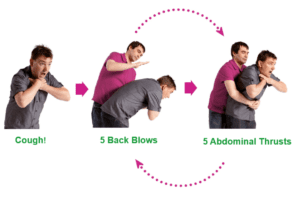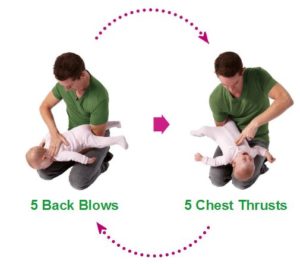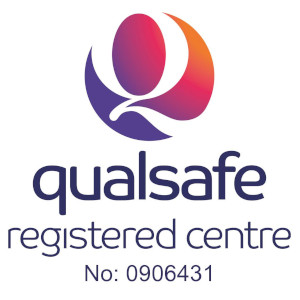Do you worry if someone Chokes? Unsure what to do?
Did you know how to treat a choking person? Did you know adults over the age of 80 are more prone to choking?
Every day, roughly 40 children under the age of five are brought to the hospital after choking or eating something harmful. In the last four years, 14 children under the age of five have died as a result of this.
Choking is the fourth most prevalent cause of death from an unintentional injury. If someone you knew choked, or even a child? Would you know what to do?
Through our experience of listening to choking stories in the classroom in our first aid courses, the most common object that causes choking could include: meat, grapes, mini eggs, boiled sweets, water, nuts, bread, and the list continues.
Choking can easily happen, especially while talking and laughing during eating. Children can happen during walking or run while they have food or objects in their mouths. More commonly; lollipops. Knowing how to treat someone who is choking can be the difference between life and death. Acting fast can save a choking person’s life.
Recognising choking
Choking can easily happen while eating or drinking. In children more common with objects such as marbles, Lego, and small parts.
In first aid we recognise choking in two ways;
Mild Choking is where the casualty will be able to cough, answer your questions – “are you choking, and can you cough?”
Severe Choking is when the casualty is having difficulties breathing, cannot answer your question “can you cough?”, unable to cough, distressed look on their face and will become unconscious if untreated.
Choking Treatment – Adults and children over 1 year
Firstly it is important to understand the casualty is choking, and encourage them to cough as this may help. If young children have not yet reached the speech milestone, they may not answer.
Back Blows
Next; shout for help while starting the treatment of choking.
Lean the casualty forward as shown in the pictures below, and give 5 firm sharp back blows between the shoulder blades with the heel of your hand. If the object is still stuck completely the abdominal thrusts are as below.
Abdominal Thrusts
Stand behind the casualty and place both arms around them. Make a fist with one hand and place it just above the belly button. With your other hand grasp the fist hand, then pull sharply inwards and upwards. Do this up to 5 times.
The aim is to relieve the choking casualty with each thrust or back blow rather than give all 5.
If the object is still not cleared – call 999 if it hasn’t already been called, and continue with 5 back blows and 5 abdominal thrusts. If the casualty becomes unconscious help the casualty to the floor and starts compressions.

Helping a choking baby – under 12 months old
Do not use abdominal thrusts for a baby – use chest thrusts. Chest thrusts are performed using your two pictures as picture below, in the middle of the baby’s chest.

To prevent babies and young children from choking;
- cut their foods into very small pieces
- supervise children while eating
- encourage children to sit and eat rather than letting them walk around or play.
Warning
Children under 4 years should not be given mini eggs. There is a warning in red bold letters on the reverse of the packaging. Smarties are also not suggested for consumption by small children.
First Aid Courses
We offer a range of first aid courses for all ages from workplaces to education. In all of our first aid courses, we teach more in-depth about choking. We even bring out the choking vest and choking baby to show you how using the techniques above, can be completed easily and effectively to remove a blocked object.
These courses are designed for persons who care for children (Teachers, Childminders, support staff), Volunteers, or are parents or guardians;
- Emergency Paediatric – one day
- Paediatric – two day
- Parents’ first aid – 2-3 hours
- Children’s first aid – 2 hours – ages 8 plus
Apprentices, staff who are unlikely to be left alone with children, and lunchtime supervisors are all candidates for our Emergency Paediatric First Aid Training. Our one-day course includes roles and responsibilities of a first aider, first aid kits, accident reporting, reasons of a life-threatening condition, CPR, defibrillator, causes of unconsciousness and recovery position, choking, bleeding, burns, and minor injuries.
Our Paediatric First Aid Training 2-day course includes all elements of the one-day first course including; broken bones, spinal injuries, head injuries, slings, sprains and strains, diabetes, febrile convulsions, hypothermia, hyperthermia, epilepsy, poisons, eye injuries, allergies and anaphylaxis, and asthma.
This course is ideal for those working alone with children, whether you are a Teacher or Teaching Assistant working in the Early Years or a childminder. Our Paediatric courses are fully accredited. We have open courses running at our Brownhills Centre or we can come to your setting.
Additionally, if you prefer to have a short session with us and complete a bespoke parents/grandparents course; our Parent’s first aid course is for you. These start from 2 hours up to 4 hours. Can include any modules of your choice, but will cover: reasons of life-threatening conditions, CPR, Defibrillator, unconsciousness, recovery, choking and gagging, burns, and minor illnesses, including dangers within the home.
Our courses provide you the peace of mind that you’ll know what to do in the event of an emergency, such as choking. Furthermore, getting first aid training will give you the skill set of knowing exactly what to do if your child, friend, or work colleague chokes. Never put yourself in a situation where you’re thinking, “What if I knew what to do?” Get First Aid Trained Today!
Additionally, If you would like to gain hands-on experience on how to successfully remove an object, browse our courses here;
First Aid Training or Paediatric First Aid Training if you can’t see a course date please get in touch.
You can contact us on 01543 453338 or info@hmbtrainingservices.co.uk for more information
This blog is not used as a form of first aid training, only for reading and knowledge purposes.



